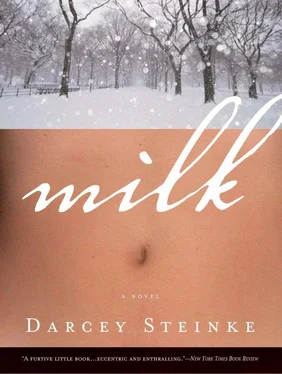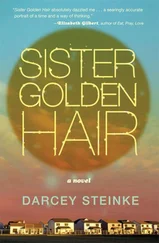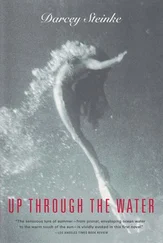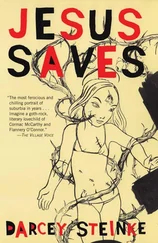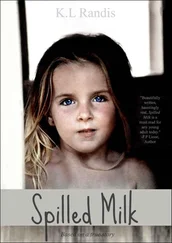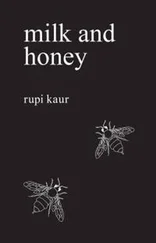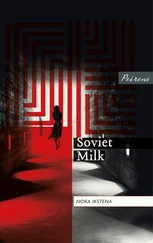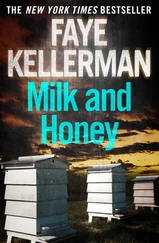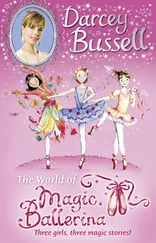WHEN MARY WOKE at two A.M. her husband was still not home. The baby slept pressed against her breast like a puppy in a litter, and she was afraid if she slept again she’d smother him with her hair. She heard this had happened in Utah, a baby choked by sucking a clump of his mother’s hair; she heard too that a father had forgotten his baby in a car seat and that the baby, in the heat of the sealed car, had died. She heard that a helicopter blade had decapitated a baby, and that a grandmother on a ferryboat had lost her grip and her tiny granddaughter had disappeared into the boat’s churning water.
The baby whimpered and agitated his mouth. She carried him to the front room, sat on the blue chair and helped him latch on to her nipple. Objects in the dark glinted, as if mica chips ran through everything. Her lucidity was terrifying; she wanted her consciousness to break down into softer parts. So she ran through all the car games she’d played as a kid. Telling the baby how first she would ask a silly question and then her mother would ask an even sillier one: Can I eat my hat for lunch? Are your underpants made of ice cream? Did you like your butterfly sandwich? And then the other game where her mother would give her a choice between two things: Would you rather be a dog or a cat? Would you rather be a cheese sandwich or a toasted cheese sandwich?
The phone started its electronic purr and for some reason she thought of an image from her childhood: President Kennedy’s wounded head, not scary now, just soft and sad. After the beep her husband said, These jokers are keeping me out all night . Muffled shouts, a girl said something in French and then her husband again: If I can get a cab, I’ll be home soon, if not, I’ll have to take the subway . And it was in the silence after the tape rolled back as she set the baby in his bassinet that a flash of light came from a source behind her. She turned and saw the sparks hovering again but this time in the corner of the bedroom.
She walked closer; each diorama showed a different scene. A porcelain lamp, a fluorescent panel, each smaller than a pea but so particular, as if her eyes were as powerful as microscopes. A chrome lamp showed a woman cutting the fingernails of a small child, and an oak tree was silhouetted by a streetlight. She stepped closer and saw the expression on the face of an old man reading a newspaper.
Outside half-hearted flurries swirled down over the sidewalk. She’d decided to put the baby into the carrier and walk down to the Brooklyn Bridge.
Flakes collected on the shoulders of her coat, and the cold bit into her bare hands. Since the very first week of her pregnancy all her senses had been elevated. She was like a wolf, able to smell cigarette smoke from half a block away and warm Chinese food from the restaurant on Court Street. Her vision was sharper too; she could make out every nuance of the rotting leaves between the grates of the gutter. Static snow flew around, and it was so quiet she could hear her own footfalls and so looked down at her boots making patterns in the fine layer of sidewalk snow.
She looked up to the lower Manhattan skyline. Office windows lit up like links in a gold chain. Flakes whirled around as she stood on the cobblestones between Bargemusic and the River Café. Bee lights covered the maples. Above them, the stone base of the bridge, steel girders fanning out. Through the restaurant’s sliding doors she saw a bartender in a white jacket move into view, pick up a glass and step toward the liquor bottles, which were tiny and radiant as jewels.
When she got home her husband was sleeping fully clothed on the bed, his hair reeking of cigarette smoke. She watched him for a while, his chest moving up and down, his eyelids jerking in REM sleep. He was very beautiful with his long face and narrow shoulders, like a stone prince on top of a crypt. When she first met him her own father had just gotten married again and she’d been new to New York City and lonely. He was a bike messenger with a long ponytail, he smoked joints in the back of churches on his rounds and on the weekends took her to raves where they took ecstasy and danced in crowds of sweaty people. Stellar sex always followed and she wanted him past all of her experience of wanting. Wanting him was like wanting the moon, an aloof and glamorous disk of shifting light.
The baby began to whine. She changed his diaper, then sat with him in the blue chair, but each time she offered her nipple, he pursed his lips and turned his face away. To calm him she walked around the apartment. It was as ritualistic as the Stations of the Cross, beginning with her polka-dot shirt; she held up the shirt on its hanger and he grew pensive. Before the pattern ceased to interest him, she moved on to the ivy plant, that one particular leaf that fascinated him, and she felt him relax his weight against her shoulder; his head fell into the crook of her neck and he slept.
MARY ORDERED MINT tea and a cranberry muffin and sat in a chair in back listening to Christmas jazz and watching snow blow horizontally past the front window. The wood tables were mostly empty, just a young woman in a ponytail writing out Christmas cards and the Man at his usual table in back. She glanced at him as he wrote in his notebook. Sometimes he used a felt-tip marker and other times she saw him use a pencil to trace a blueprint, a long sprawling single-story house. He always wore the same outfit: khaki pants creased down the front and a white button-down shirt, each cuff folded back neatly to the elbow. His shoulders were heavy and wider than her husband’s, and he had wrinkles around his eyes.
She sat down. The baby’s face was smushed against the side of the carrier, and he was elfin in his little green cap and matching mittens. He grimaced in his sleep. She shouldn’t have had that slice of onion on her tuna fish at lunch. Onions did odd things to her milk. She rocked forward to comfort him. Snowflakes outside zigzagged across the window, and inside, the wood grain of her table glimmered. She watched the counter girl use silver tongs to lay glazed donuts out in the display case.
Her husband’s story about last night was rickety, particularly his account of the hours between two and when he reached home at five. Instead of being contrite, he was angry about her questions. She’d ruined everything by being jealous; now he didn’t want to stay home Christmas Eve. They’d planned to make dinner and watch a video, open the presents she had bought for the baby. Now he was going to the Orphan’s Party his friend Roger threw every year.
Mary yelped and sprang up; something had bitten her leg. A hand laid down a wedge of napkins over the spilled tea, and when she turned she saw the Man leaning forward, so close she could have touched his face.
“Sorry,” Mary said, motioning to the tipped paper teacup. “I’m clumsy.”
“Not to worry,” he said. “Are you wet?”
Mary examined the baby and then her coat for spots, but the tea had only stained her pant leg. “I’m fine,” she said.
The Man hesitated; he didn’t seem to want to go back to his own table. “You look tired.”
Mary blushed. “I guess I am,” she said. “You know, not a lot, just a little.” She pressed her fingernails into the palm of her hand and thought of herself in her ratty coat moving around the neighborhood.
“My name is John.” He held out his hand.
“Mary,” she said, touching his thick fingers.
“Can I sit here?” he said, pulling out a chair.
Mary looked at the empty chair and nodded.
“What are you reading?” She pointed to the book splayed in half on the table.
“Poincaré this evening. I’m rather taken with his claim that he could move material objects from one closed container to another.”
Читать дальше
